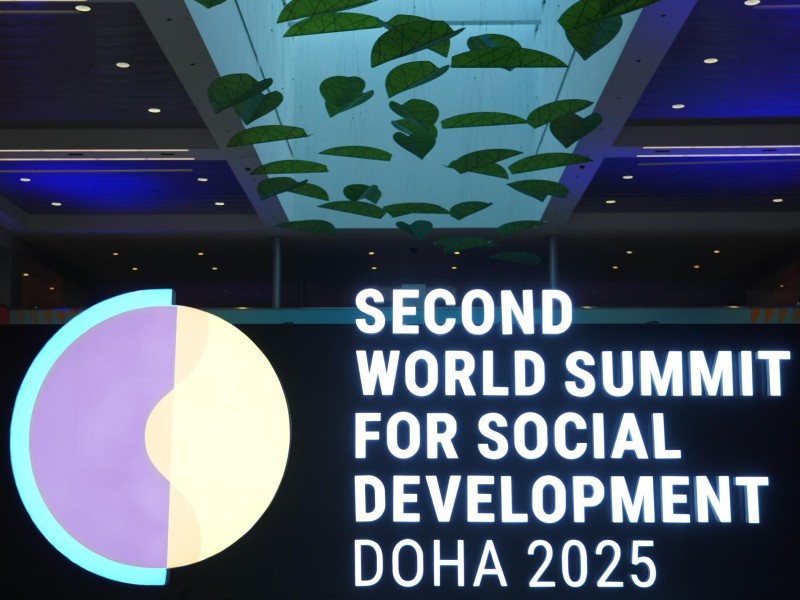DOHA, Qatar, 04 November 2025 – At a high-level session held at the World Summit on Social Development on Tuesday, global education leaders issued an urgent call for a fundamental transformation of education systems, warning that a failure to bridge the gap between schooling and skills is exacerbating inequality and stifling economic growth, particularly in the Global South.
The session, titled “Foundations for the Future: Basic Education as a Pathway to Skills and Jobs,” featured a unified message from government officials, international envoys, and youth advocates: the current model is broken, and incremental change is no longer enough.
“What would life be without the basic skills to learn, read, and understand essential services?” asked Ms. Samantha Umar, a Youth Leader for the Global Partnership for Education (GPE), in her opening remarks. She framed education as the non-negotiable foundation for human development and social inclusion, highlighting the urgency of addressing equity, opportunity, and employability for the world’s youth.
The keynote address by ECA Deputy Executive Secretary Ms. Hanan Morsy anchored the discussion in the context of Africa's future. She stressed that education and skills are the core drivers of the continent's structural transformation. "The widening gap between what education systems deliver and the needs of the labor market is a crisis we must address at both policy and community levels," Morsy stated. She called for a shift from static curricula to dynamic learning systems that integrate digital literacy and coding, positioning education as the ultimate "equalizer" to reach the most vulnerable.
A Consensus on Core Pillars, A Diversity of Approaches
A clear consensus emerged around several key pillars for reform:
-
Skills over Rote Learning: A move towards competency-based education that prioritizes critical thinking and creativity.
-
Teacher Empowerment: Significant investment in teacher training and improving working conditions.
-
Digital Integration: Leveraging technology to improve access and learning outcomes.
-
Lifelong Learning: Promoting continuous skills development for employability in a changing economy.
-
Public-Private Partnerships: Mobilizing new financing and aligning education with market needs.
In addition, the perspectives on implementation offered regional emphases.
Mr. Kamau Moses from the State Department for Social Protection and Senior Citizen Affairs, presented Kenya’s concrete reforms and efforts to transition to a competency-based curriculum as well as the establishment of a National Qualification Framework to ensure skills are coherently recognized.
On national policy and infrastructure, Mr. Refat Sabbah, President of the Global Campaign for Education (GCE), advocated for education as a fundamental right and called for fiscal reforms to ensure it is fully funded. "Education is an investment, not a cost," echoed Mr. Nesmy Manigat of the GPE, a sentiment that became a recurring theme throughout the session.
For her part, Ms. Roxana Mînzatu, Executive Vice-President for the European Commission, reinforced the economic argument, noting that each additional year of schooling can increase an individual's earnings by an estimated 10%. She outlined a three-part EU package focused on basic skills, teacher support, and technology, emphasizing that "providing equal opportunities for all is ambitious, but timely and necessary."
From Dialogue to Delivery
The practical challenge of translating these commitments into measurable progress was addressed by Ms. Nahla Valji, a UN Resident Coordinator, who highlighted the critical role of partnerships on the ground. "The collaboration between entities like GPE and the UN is vital for improving education infrastructure and ensuring equitable access," she said, underscoring that investment in teacher capacity yields dividends across the entire educational journey.
The session concluded with a reinforced, shared responsibility to reimagine education as a transformative force. In a world facing rapid change, the leaders at the Summit in Doha agreed that building resilient, inclusive, and relevant education systems is not merely an educational imperative, but the foundational investment for the future the world deserves.
Issued by:
Communications Section
Economic Commission for Africa
PO Box 3001
Addis Ababa
Ethiopia
Tel: +251 11 551 5826
E-mail: eca-info@un.org
